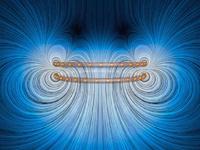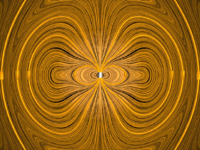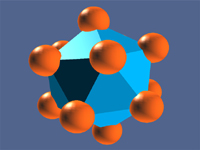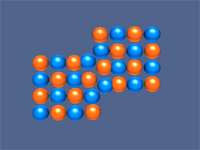 |
Title: Two
Rings of Current Repelling
This is an animation of the magnetic field generated by two
coils carrying unequal currents in opposite directions. When
the current is turned on, the resulting magnetic field pressure
between the two rings pushes the them apart. The motions of
the field lines are in the direction of the local Poynting flux
vector. Set Windows Media Player to "repeat".
|
|
 |
Title: Dipole
Radiation
An animation of electric dipole radiation is presented. The
dipole moment vector is always vertical, and its magnitude varies
sinusoidally by 10%. We show the fields in the quasi-static
zone, the induction zone, and the radiation zone. The motions
of the field lines are in the direction of the local Poynting
flux vector. Set Windows Media Player to "repeat".
|
|
 |
Title: Simulation
of a Nucleus and Four Electrons
A simulation of how an atom might form. A nucleus with a positive
net charge attracts four electrons, which are eventually "captured"
and held in a stable configuration. The quantum mechanical "Pauli"
force prevents the particles from collapsing in on one another,
while a damping term allows them to "settle down".
|
|
 |
Title: The
Ion Trap
Twelve identical charges in a potential well that forces them
together against their mutual repulsion. Select "Fullscreen
Version". Left click and drag to rotate the camera. Shift
click on a given charge to move it with the arrow keys. Press
"p" or "n" to add charges of positive or
negative sign. Press "s" for a bounding polygon after
the charges have settled down.
|
|
 |
Title: Colliding
Lattices
Colliding Lattices simulates the interaction of charged
particles in two dimensions. In this program, you can observe
the results of a collision between two rectangular lattices
of variable dimensions and initial velocities. Select "Fullscreen
Version". After selecting a dimension, position, and velocity
for each, click the "Start" button to run the simulation.
|
|






